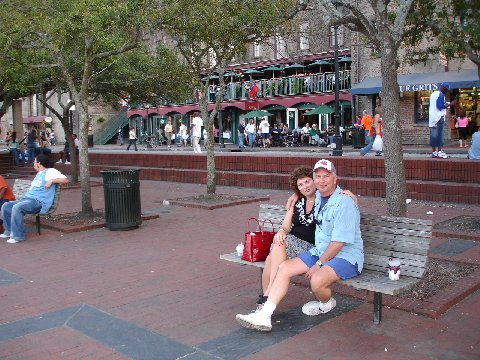

 My husband and I visited the Maesa Elephant Camp in Chiang Mai. At first I really wasn't all that interested in going but I am glad I did. I was absolutely amazed at the intelligence and training of the Thai Elephant "Chang". I saw them paint, play games, play musical instruments, dance. They were absolutely charming. Our Guides love of the elephant was contagious. I learned how to tell a male from a female by the tusks. The males tusks are larger and on the outside of the mouth , the females are small and you can only see them when she smiles. I thought that was sweet. The elephant we rode was a 41 year old female called Mae Khum Mee.
My husband and I visited the Maesa Elephant Camp in Chiang Mai. At first I really wasn't all that interested in going but I am glad I did. I was absolutely amazed at the intelligence and training of the Thai Elephant "Chang". I saw them paint, play games, play musical instruments, dance. They were absolutely charming. Our Guides love of the elephant was contagious. I learned how to tell a male from a female by the tusks. The males tusks are larger and on the outside of the mouth , the females are small and you can only see them when she smiles. I thought that was sweet. The elephant we rode was a 41 year old female called Mae Khum Mee.The Mahoot took my foot and told me to rub her back that she liked it, so I did. As we rode in the jungle for 45 mins. going over rough terrain my foot somehow shifted and began rubbing the mahoots backside, my husband laughed because he had done the same thing. The mahoot had no complaints.
****************
**Info from Camp Brochure**
Maesa Elephant Camp" flanks a rushing river in a beautiful lush tropical valley a mere twenty minutes scenic drive from downtown Chiang Mai. Having been open for nearly thirty years and currently home to seventy eight elephants, we have become leaders and experts in the field of elephant breeding, training, healthcare and sustainable tourism. Asian elephants have long been used as beasts of burden by man - transportation, timber logging or in war.
In the early days of elephant camps these were the main abilities showcased, but it was the camp’s founder, Choochart Kalmapijit’s understanding of the deep intelligence of elephants that inspired him to establish Maesa Elephant Camp in 1976. Over the years Choochart purchased elephants from all over the country, and with their mahouts and other experts, worked and fell in love with the elephants, revealing one skill or fact after another about these pachyderms that have not only
helped to develop Maesa’s reputations over the years, but help further the cause of the conservation and future of the Asian elephant.
The well being and nourishment of our elephants are of prime importance and the total of six tons of grass, bananas and sugarcane that go to feed our elephants daily are self grown. We also grow special grasses and herbs which all combine to assure the health and well being of all our elephants. Being the first elephant camp certified by ISO 9001 version 2008, we are determined to offer visitors a new-age elephant camp which gives our visitors a real glimpse into the lives and facts about elephants.
What they eat, how they live, their biology, their future or plight as well as the continued development and promotion of their skills, intelligence and abilities are of utmost importance to our long term goals.
Of great significance is Choochart’s founding of the Association for the Thai Elephant Procreation to encourage the breeding so that the future of the Asian elephants is assured. At the turn of the twentieth century there were over one hundred thousand elephants in Thailand, today there are less than five. Through research, years of trial and error and a determination to succeed, Maesa now has a very successful breeding programme. Only the best bulls and cows are selected for the procreation programme which has lead to the birth of
many healthy baby elephants. One thing you can always be assured of is that elephants at Maesa Elephant Camp are, and always will be, mentally and physically healthy.
Thai people have long had a place in their hearts for elephants. Whether they worked together to log timber, travel across harsh terrain or lead troops into battle, Thai people have had a close relationship with elephants for centuries. Kachasart is a branch of study dedicated solely to elephants, and this local wisdom has been passed down from generation to generation covering such facts as to how to teach mahouts to train elephants, how to build life-long relationships and communicate with elephants and how to care for them. The art of elephant training requires much endurance and time as well as an intimate and considerate relationship between each elephant and its mahout.
At Maesa Elephant Camp, all elephants are trained to get acquainted with human beings and especially their mahouts as a basic platform for other advanced training. During this period of three months, the mahouts will teach their elephants how to communicate with them, at the same time building an intimate relationship with them by such activities as bathing, jungle walks and other activities.
Following this introduction, a more advanced training programme is started where mahouts and elephants work together on mounting and dismounts, playing games and practicing various skill sets. Each training activity is taken at a different pace for each animal according to how they adjust to the challenge. It is important that the elephants enjoy their activities and are not overly exerted.
Through this training, each elephant’s preference and skills emerge and in time each and every elephant at Maesa Elephant Camp is able to entertain, act or use their particular skill so that they enjoy their daily jobs and our visitors enjoy an array of skills which is often most unexpected to those unfamiliar with elephants. Similar to human being, elephants understand the meaning of applause and appreciate it. Give them a big clap after each show! Bravo!
Maesa Elephant Camp" flanks a rushing river in a beautiful lush tropical valley a mere twenty minutes scenic drive from downtown Chiang Mai. Having been open for nearly thirty years and currently home to seventy eight elephants, we have become leaders and experts in the field of elephant breeding, training, healthcare and sustainable tourism. Asian elephants have long been used as beasts of burden by man - transportation, timber logging or in war.
In the early days of elephant camps these were the main abilities showcased, but it was the camp’s founder, Choochart Kalmapijit’s understanding of the deep intelligence of elephants that inspired him to establish Maesa Elephant Camp in 1976. Over the years Choochart purchased elephants from all over the country, and with their mahouts and other experts, worked and fell in love with the elephants, revealing one skill or fact after another about these pachyderms that have not only
helped to develop Maesa’s reputations over the years, but help further the cause of the conservation and future of the Asian elephant.
The well being and nourishment of our elephants are of prime importance and the total of six tons of grass, bananas and sugarcane that go to feed our elephants daily are self grown. We also grow special grasses and herbs which all combine to assure the health and well being of all our elephants. Being the first elephant camp certified by ISO 9001 version 2008, we are determined to offer visitors a new-age elephant camp which gives our visitors a real glimpse into the lives and facts about elephants.
What they eat, how they live, their biology, their future or plight as well as the continued development and promotion of their skills, intelligence and abilities are of utmost importance to our long term goals.
Of great significance is Choochart’s founding of the Association for the Thai Elephant Procreation to encourage the breeding so that the future of the Asian elephants is assured. At the turn of the twentieth century there were over one hundred thousand elephants in Thailand, today there are less than five. Through research, years of trial and error and a determination to succeed, Maesa now has a very successful breeding programme. Only the best bulls and cows are selected for the procreation programme which has lead to the birth of
many healthy baby elephants. One thing you can always be assured of is that elephants at Maesa Elephant Camp are, and always will be, mentally and physically healthy.
Thai people have long had a place in their hearts for elephants. Whether they worked together to log timber, travel across harsh terrain or lead troops into battle, Thai people have had a close relationship with elephants for centuries. Kachasart is a branch of study dedicated solely to elephants, and this local wisdom has been passed down from generation to generation covering such facts as to how to teach mahouts to train elephants, how to build life-long relationships and communicate with elephants and how to care for them. The art of elephant training requires much endurance and time as well as an intimate and considerate relationship between each elephant and its mahout.
At Maesa Elephant Camp, all elephants are trained to get acquainted with human beings and especially their mahouts as a basic platform for other advanced training. During this period of three months, the mahouts will teach their elephants how to communicate with them, at the same time building an intimate relationship with them by such activities as bathing, jungle walks and other activities.
Following this introduction, a more advanced training programme is started where mahouts and elephants work together on mounting and dismounts, playing games and practicing various skill sets. Each training activity is taken at a different pace for each animal according to how they adjust to the challenge. It is important that the elephants enjoy their activities and are not overly exerted.
Through this training, each elephant’s preference and skills emerge and in time each and every elephant at Maesa Elephant Camp is able to entertain, act or use their particular skill so that they enjoy their daily jobs and our visitors enjoy an array of skills which is often most unexpected to those unfamiliar with elephants. Similar to human being, elephants understand the meaning of applause and appreciate it. Give them a big clap after each show! Bravo!










No comments:
Post a Comment